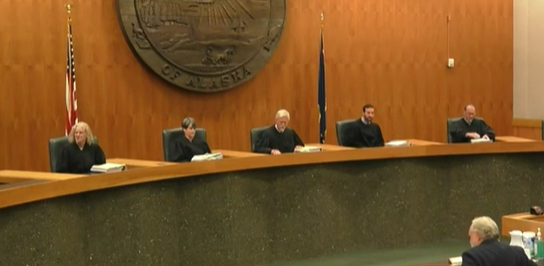The Alaska Supreme Court convened on Tuesday, September 12th, to hear arguments in the case Soldotna v. State, Local Boundary Commission.
Since 2020, the case disputing the Local Boundary Commission’s right to convert a City of Soldotna annexation decision from a legislative review to a local option has systematically worked its way up the Alaska Court System.
The process of Soldotna annexing just over 2.6 square miles of land in Funny River, Ridgeway, K-Beach, and Skyview has been in the works since 2005, and was approved by the Boundary Commission in 2019. Then in 2020, when the city chose to pursue the final leg of the process via legislative review whereby the annexation would have been contingent upon approval by the Alaska Legislature, the LBC changed that decision to a local option, which puts the issue to a local vote for final approval.
The commission’s 3-2 vote was the first time it had ever overturned an annexation by legislative review in favor of the local option.
Although several points were made by both opposing counsels before the 5 justice Supreme Court, the primary matter of contention was in regard to the authority of the Alaska Local Boundary Commission, and whether or not the LBC reached beyond that authority by overturning the City of Soldotna’s decision to pursue annexation by legislative review.
According to Soldotna, the authority of the boundary commission was exceeded when it made a ruling that was inconsistent with the legal standards by which its authority is defined.
To this point, attorney for the City of Soldotna, Brooks Chandler, argued that, based on said standards, in addition to historical actions of this boundary commission, overturning the City’s decision was an act of “rulemaking,” which is not permitted.
“If an agency pens a standard freehand in the course of a single adjudication, that is an improper act of rulemaking,” Chandler said. “If the standard articulated by the agency is inconsistent with past adjudications, then it is a new rule that requires rulemaking. That’s what we have here. We have a standard that a city must not have undertaken prior Unanimous Consent annexations, or it may be disqualified from ever using the legislative review annexation … It’s a new rule. It required rulemaking.”
In support of that, Chandler referenced prior Soldotna annexations by which the city established the legal precedent for annexation by legislative review, and that the LBC’s decision to overrule was, in effect, an on-the-fly amendment to that standard.
“The voters are not – the public’s not – too interested in this approach, and in the past they haven’t done this. They haven’t gone legislative review,” Milks said. “And the borough is not supporting legislative review, which would again indicate that the need is not so significantly high for annexation that the borough would come in and support it. And so I think you apply all of those factors, and again, they’re judgments, they are judgments made by a legislative type body.”
Milks claimed that the language of the standards were more general, and not so resolute as the City of Soldotna presented them. “It’s a general term, and general phrases like that are not unusual in the law, and certainly courts apply things where they’ll do balancing tests or general statements. I think it’s particularly appropriate when you’re dealing with an agency that’s been delegated this legislative authority to sort out, case by case, these questions of local boundary decisions.”
“The ultimate judgment, and these are judgment calls, belongs with the with the Commission,” Milks said.
In Chandler’s closing remarks he pointed to other instances around the State of Alaska where the LBC did not take action as it did with Soldotna. Specifically, he references Palmer, where the city has annexed sections of land dozens of times by legislative review without a reversal, and an instance where the City of Homer was allowed to pursue annexation by legislative review despite public dissent.
“This decision is also inconsistent with the Homer decision in which there was vociferous public opposition to annexation,” Chandler said. “[There were] many demands for a vote, and the Commission approved legislative review. And so that Argues to this court that it is not reasonable for a Commission to treat two similar annexation petitions differently. No effort by the Commission was made to distinguish this petition from Palmer’s petition, from Homer’s petition, from Fairbanks petition, from any petition that had previously approved for legislative review.”
Chandler also reasserted that the fluidity of the Commission’s argument was inconsistent with both historical and legal precedent. “This is all existing precedent, and the exercise of applying that precedent to the facts of this case compels the conclusion that the Commission has gone off the rails here. They’ve acted arbitrarily, unreasonably, engaged in rulemaking, and their decision should be reversed.”
The Supreme Court will take the opposing arguments under advisement, and render a decision at a later date.

